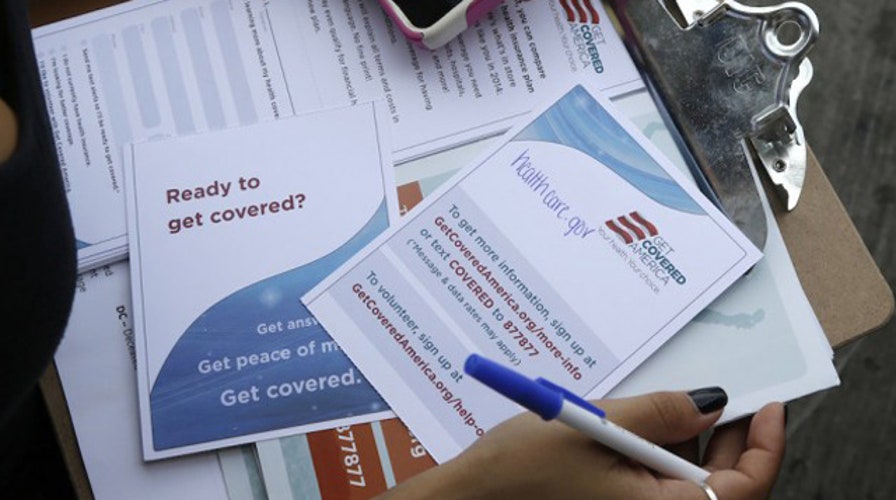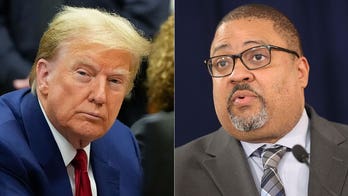Republicans blame ObamaCare for health care mergers
Joe Lestingi and Ron Bonjean on GOP claiming there is less competition
Republican officials, after battling for years with Washington over ObamaCare’s Medicaid expansion, are testing a middle ground that could reshape the program – by making recipients pay for part of their health care.
Indiana has gone the furthest with this plan, but other states are enacting or debating similar measures. While some worry making low-income recipients pay for part of their Medicaid costs is unfair, the change is notable in that the Obama administration is not fighting it tooth and nail.
“It’s a very fluid scenario,” said Matt Salo, executive director of the National Association of Medicaid Directors. “There’s now a handful of states that are engaged in direct negotiations with CMS [Centers for Medicare and Medicaid Services] or are having [a] back-and-forth debate within their house.”
Indiana, led by GOP Gov. Mike Pence, approved the Healthy Indiana Plan in February. In doing so, the state replaced traditional Medicaid and expanded it, as sought under ObamaCare – something a number of Republican-led states have still not done.
The catch: Indiana’s plan requires recipients pay for part of the cost. In order to get insurance, recipients would pay monthly premiums (based on income, ranging from $1 to $27), in addition to various co-payments (anywhere from $4 to $75). If a recipient pays their premiums on time, they can qualify for expanded benefits and have co-pays limited to only non-emergency ER visits.
If it works, it would be a breakthrough for GOP-led states that want to expand Medicaid and cover the uninsured – yet don’t want the program to be an all-expenses-paid entitlement. About 297,000 Indiana residents have enrolled in the program as of July 1. The state says 72 percent are paying their premiums on time.
Under the traditional Medicaid expansion, the federal government would cover 100 percent of the cost for states, and ratchet that down to 90 percent by 2020.
Indiana’s plan relies solely on its own resources, but Pence says it “will require no new state spending and no new taxes.” The Healthy Indiana Plan will be financed by state cigarette tax revenue and fees collected from hospitals. State figures estimate that the program will cost $1.63 billion.
Four other states also have gotten federal waivers for their own cost-sharing expansions. Arkansas got the ball rolling with its approval in September 2013, followed by Iowa, Michigan, and Pennsylvania.
Indiana, though, went a step further. The state’s plan was unprecedented because it says recipients can lose coverage for not paying premiums.
Alaska, Montana, Utah, and Tennessee are now debating similar shared-cost proposals – borrowing elements from the Indiana plan -- according to Salo. Most, though not all, of these states are led by GOP governors.
“The Healthy Indiana Plan … is aspirational,” Brian Neale, Pence’s health policy director, told the Los Angeles Times. “We believe that individuals, if offered the opportunity, will make the right choices.” The plan requires recipients to contribute to a health savings account that tracks medical expenses. Patients get care as long as they make their payments, and can lower their rates by getting various preventive care.
But charging poor patients can be problematic. Studies show that charging premiums and co-pays, and penalizing people for excessive emergency room visits, typically steers poor people away from the doctor’s office.
“People don’t get necessary care,” Judith Solomon, a health analyst at the Center on Budget and Policy Priorities, told the Los Angeles Times. She said plans like Indiana’s often prevent the poor from actually getting decent treatment.
But the federal government has become more open to alternative plans.
In late January, then-CMS administrator Marilyn Tavenner approved Indiana’s waivers and congratulated the state on its program. Secretary of Health and Human Services Sylvia Mathews Burwell has said the administration is open to alternatives.
ObamaCare itself calls for Medicaid to be extended to childless adults making up to 138 percent of the poverty line. The Supreme Court, however, ruled the expansion optional for states in 2012. Twenty states remain resistant to any expansions. Indiana originally was in that group, but reversed course with its cost-sharing plan.
Salo said the program represents a deep change in philosophy, bringing a conservative approach to a longstanding entitlement. “What you’re seeing from more conservative states is that they want more consumer engagement in health care … skin in the game,” he said.
Further, Salo said Pence is “a bona-fide conservative red state governor” and it may be “hard for other states to say Medicaid can’t be a conservative thing.”





